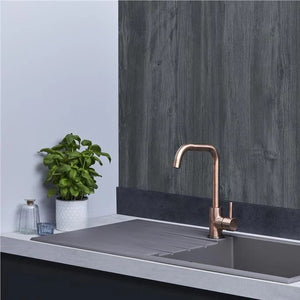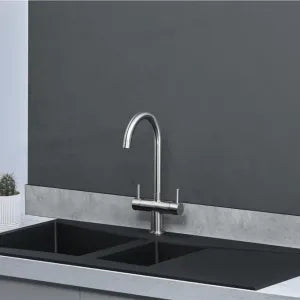In today’s world, where environmental consciousness is at the forefront of consumer decision-making, the demand for sustainable home fixtures is on the rise. Among these, composite sinks emerge as a shining example of eco-innovation, offering a blend of durability, functionality, and environmental responsibility. Let’s delve into the eco benefits of composite sinks and explore why they’re becoming a top choice for environmentally-conscious homeowners.
1. Sustainable Materials
Composite sinks, particularly those crafted from eco-friendly materials like Liquida’s bio composite material, are revolutionizing the kitchen industry. Composed of a blend of organic materials, mineral fillers, long glass fibers, and additives, these sinks boast a significantly lower carbon footprint compared to traditional materials like stainless steel. With a composition that includes bio-sourced components derived from indirect food resources such as vegetable oils from beetroot and straw, composite sinks exemplify sustainable manufacturing practices.
2. Reduced Carbon Emissions
One of the most significant eco benefits of composite sinks lies in their ability to reduce carbon emissions throughout their lifecycle. Liquida sinks, for example, demonstrate a remarkable 30% to 50% reduction in CO2 emissions compared to steel sinks. This reduction is attributed to the eco-friendly composition of the sink materials, as well as the manufacturing processes that prioritize sustainability and environmental responsibility. By choosing composite sinks, homeowners can significantly lessen their environmental impact without compromising on quality or performance.
3. Longevity and Durability
Composite sinks are renowned for their durability, making them a long-lasting investment for eco-minded consumers. Unlike traditional materials that may degrade over time, composite sinks are resistant to scratches, stains, and heat, ensuring they retain their aesthetic appeal for years to come. This longevity reduces the need for frequent replacements, further minimizing waste and environmental impact.
4. Water Conservation
In addition to their material composition, composite sinks also contribute to water conservation efforts in the kitchen. Many composite sinks feature innovative designs that promote water efficiency, such as deep basins that allow for efficient water use during dishwashing. By conserving water and reducing overall water consumption, composite sinks support sustainable living practices and contribute to a greener future.
5. Responsible Manufacturing
Beyond their eco-friendly materials, composite sink manufacturers like Liquida uphold responsible manufacturing practices that prioritize sustainability and environmental stewardship. From sourcing raw materials to production processes, these manufacturers adhere to stringent standards and certifications to minimize their environmental footprint. This commitment to sustainability extends beyond the finished product, ensuring that every aspect of the manufacturing process aligns with eco-conscious values.
In conclusion, composite sinks offer a myriad of eco benefits that make them a sustainable choice for modern kitchens. From their use of eco-friendly materials to their reduced carbon emissions and water conservation efforts, composite sinks embody the principles of environmental responsibility. By choosing composite sinks, homeowners can enjoy durable, stylish fixtures while making a positive impact on the planet.









